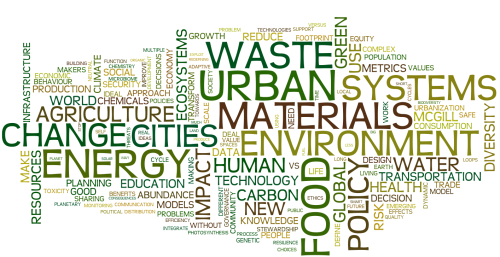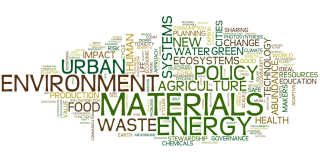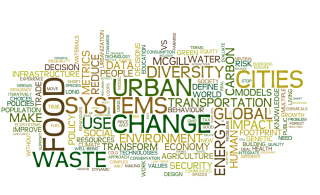The MSSI Research Theme Consultation Workshops (May 2017)
The MSSI Research Theme Consultation Workshops gathered faculty from across the university to brainstorm, debate, and ultimately co-create cutting edge questions in sustainability. The 70 invited participants included all NOI lead authors and Lightning Talk presenters and represented 30 departments from 8 faculties. The outcomes [link to the to questions and wordles below] of these facilitated discussions demonstrated how McGill’s top sustainability experts envision the work needed to create a sustainable future. In combination with the Grand Challenge NOIs, these sessions shaped the first three MSSI research themes: Sustainable Landscapes for the Future, Creating Sustainable Materials for the Future and Adapting Cities for the Future.


Participants engaged enthusiastically in the workshops, to the extent that despite the room’s tropical temperature, the afternoon coffee break was ignored by the many groups who were deep in animated discussion. The post-workshop feedback was overwhelmingly positive, with a frequent observation being that meeting and discussing with colleagues from other disciplines and faculties during MSSI events is intellectually stimulating and leads to unexpected and rewarding connections. The overwhelming consensus was that MSSI workshops should become an annual event.
The process
Divided between morning and afternoon sessions, attendees were assigned to 6 tables of 5 - 6 participants each, selected to ensure each had a diversity of expertise and research interests. Tables were tasked with brainstorming to come up with at least 30 research questions or ideas of critical importance in the field of sustainability on which significant progress could be made within the next 2 - 3 years. Each table then used a short-list of criteria such as originality and feasibility to narrow the list down to two ideas, and was given just 30 seconds in which to present these to the entire group. The remaining time was devoted to a group discussion of these 12 ideas. Following the workshop, the words generated by each table during this process (on stickies, flipcharts and whiteboards) were converted into word clouds. These, along with the 25 presented ideas (one group presented 3), can be seen below.
The outcomes
Several key themes developed in both sessions. These included creation of new clean materials, rethinking urban environments, food production systems and their impacts, managing and minimizing waste, connecting research to policy and action, monitoring and metrics, risk and uncertainty, and connecting producers to consumers. More esoteric issues under discussion included the meaning of ‘sustainability’, the challenge of measuring and placing a value on ecosystem services, and whether the current economic model is consistent with concepts of sustainability.
Differences in expertise between the morning and afternoon sessions were reflected in their different emphases. Participants in the morning were more focused on science- and technology-based solutions such as production of new, green, carbon-neutral materials, and the importance of carbon neutrality in systems, whereas the afternoon session discussed risk and uncertainty, changing behaviors and increasing social equity as well as the challenges of sustainable food production, creating carbon neutral cities and societies, and urban and peri-urban areas as foci for change.
Several cross-cutting ideas stood out, including the power of food to connect and engage the public in discussions on sustainability (“people relate to food”), and the huge challenge inherent in achieving global food security and addressing its associated social equity issues, from production to distribution to equity and access to health and culture for workers in food production. Other cross-cutting themes included education and connecting research and work to policy and action.
Word clouds created from notes generated by groups during the workshops and the list of 25 research ideas/questions can be seen below.
Wordle based on the words from both, the morning & afternoon sessions
L - Landscapes / M - Materials / C - Cities
| Idea | Category |
|---|---|
| Sustainable material production | M |
| Matter: creating materials, abundance to generation of ideal materials | M |
| Is what is good for human health also good for the environment (food, water, pharma, agriculture, materials)? | ML |
| How to feed the planet without trashing it (closing production loop) | L |
| How to build sustainable footprint criteria -> environmental perturbators and farming practices | L |
| Food security through low-C agriculture. Influence of local vs. imported food, dietary habits, affluence etc. on food choices. | LC |
| Develop integrative methods, models, metrics that link environment and health | LC |
| System modelling of earth’s social-ecological dynamics (earth as a metabolic system) | LC |
| How risk and uncertainty get used in sustainability policy, focusing on coastal and waterfront cities | LC |
| Sustainability for cold climates (e.g., Canadian) | LC |
| Linkages of urban-rural landscapes, particularly in agriculture | LC |
| Urban food security – production, transport, disposal. Energy, nutrient use, nutrition, social equity | C |
| Framing urban systems through the microbiome | C |
| Chaotic urbanisation, slum development – transforming slums into sustainable communities of full citizens | C |
| Urban transportation. How to build integrated and available urban transport systems | C |
| Carbon neutrality in cities. Smart multifunctional materials for energy and storage, materials | CM |
| Sustainable buildings – sustainable construction | CM |
| Sustainable footprint definition and measurement – how to include sustainable footprint in human decision-making | MLC |
| How to measure values for sustainability (cultural, technological, scientific, economical, health) | MLC |
| Sustainability in circular economy (social to ecological), exploiting big data and sensors, social equity | MLC |
| Zero-depletion economy (economy & policy) | MLC |
| Stewardship – redefine human stewardship (everyone must have a stake) | MLC |
| Virtual prototyping. Theory to implementation (experiments to policy in ecosystem) | MLC |
| Communication to behaviour change. What to teach in econ?, outreach plan | Other |
| McGill as a living sustainable lab (consumption to governance) | Other |




